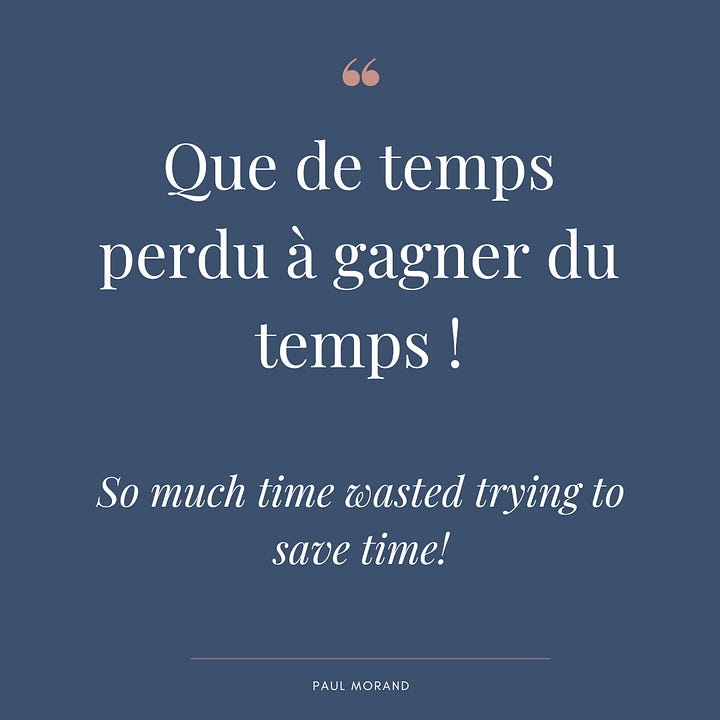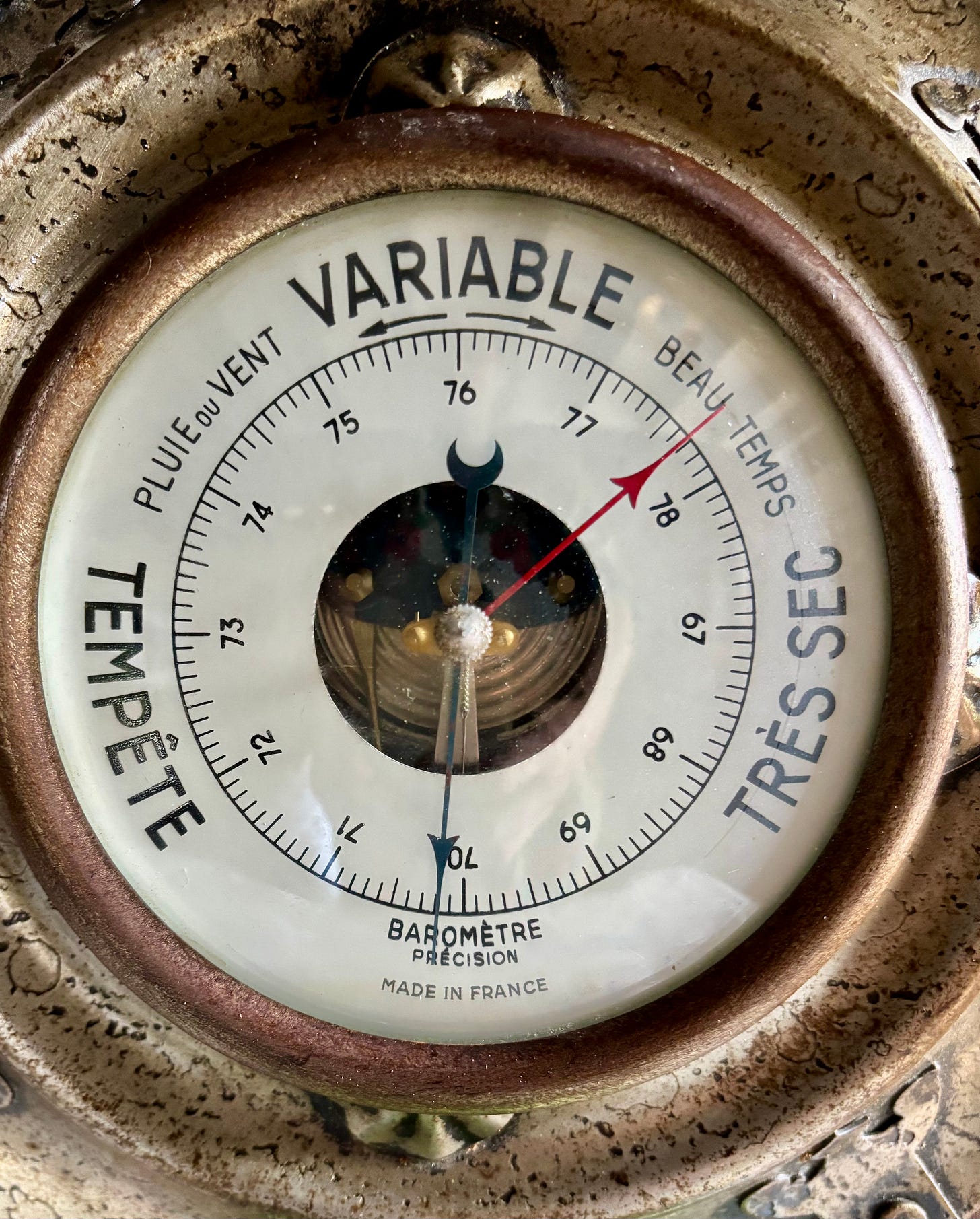On 'making' and 'spending' time in Paris
What I've learned about France's most sacred currency - time.
Bonjour Les Amis - welcome back.
It’s been two weeks since we last spoke. In some ways, it feels like ages ago—and in others, just yesterday. If you’re thinking, “Isn’t it strange how time works?” you’re exactly where I am.
Time is weighing heavily on me these days. I find myself preoccupied with how much I have of it, particularly as I look at the year ahead. I admit that my time would be better spent on using it wisely rather than pining about it, but it’s just who I am.
Oddly enough, this preoccupation has made me feel more at home in France. Ever so often, someone will ask me for advice on how best to understand France (and the French). Two decades later, I have distilled my advice to one key insight: le temps (time).
If you want to understand France and the French people (and the language, for that matter), you need time. But not just in the literal chronological sense. I mean understanding what truly matters - understanding the relationship to time and its importance here in France.
My adopted country and my native one may experience and express time differently, but one truth remains: wherever you are, time is the most precious thing we have. And since we can never really make more of it, we’d better choose wisely how we use it.
All the more reason to stop and smell the roses.
Speaking of your time…
Have you ever thought about how you talk about time—how you express yourself when you speak about using it? I love to examine the subtle nuances of how we talk about things, culture to culture.
I started thinking about this thanks to a coffee date with a friend. I was talking about my schedule for the week ahead—what I had going on—how I planned to use my time—when she stopped me mid-sentence and said, “Jane, you are talking about time like it’s money! You cannot ‘make’ time; you just have to take it!”
That moment stayed with me (it’s one of the joys of navigating literal translations in a second language). It prompted me to think about how I tend to frame time as an English speaker, especially compared to many of my French friends.
I might say, “I’ll make time for…”
They’re more likely to say, “Je vais prendre le temps de…” (I will take the time to…)
I say, “I spent my time…”
They say, “J’ai passé mon temps…” (I passed my time…)
And it’s true: when I listen closely, I realize I often speak about time like it’s currency. Like it’s something to spend, earn, or even waste.
No wonder I have an illusion that I can also ‘save’ it.
However I may speak of it, the older I get, the more I realize how precious it is.


So, whatever words we use, being intentional about what we do with our time is what counts—doing something meaningful with it rather than just watching the clock.
Speaking of watching the clock…
I learned early on that the clock ticks differently here in France. Time is measured differently, and it’s not minute by minute.
My first business meeting in France taught me one of my most valuable lessons: time takes the time it needs.
I assumed we had a hard start and end time for the meeting. Boy, was I wrong. I also thought the meeting time would be dedicated solely to discussing business topics. Wrong again. The time in our meeting was dedicated to fortifying relationships, building trust, and getting to know the person across the table. That was the most important part of the meeting—a contract was secondary.
This is one of the most important lessons I learned here in France, for business and otherwise. Building a relationship is always the priority, and that will take whatever time is necessary.
I was reminded of this not long ago when a friend came to visit. I was juggling work and trying to sneak away for the afternoon to spend time with her. She asked when I’d be free to meet. I told her: early afternoon. Naturally, she wanted an exact time. But in this case, pas possible.
If I had the day to myself, I would have told her an exact time, and she knows I would be there at the stroke of the hour (well, she knows I’d be there early because that’s how I am). But I had a string of meetings with long-standing partners, and I knew better than to make promises I couldn’t keep. These meetings would take the time they needed.
And inevitably, they start a little later than planned because of something very, very important: Coffee. It’s never rushed, never skipped. I’m always offered one, and I never refuse. That small ritual—a shared coffee before diving into anything else—is just as important as the meeting itself.
By the third meeting, I might have the caffeine shakes, but I wouldn’t trade it for anything. Those few extra moments, just enjoying a simple coffee together, make our meeting more human, somehow softer.
Speaking of soft…
In a country where time is so important, I also find that it can be so vague and undefined. More times than I can even recount, I have been left trying to translate the words someone said into an exact hour. Rather than being precise and specific, time in France can be a notion.
If someone says, I’ll stop by during the :
matin : it’s likely to be between 9 am and 11:30 am
midi : it’s likely to be between 11:30 am and 2 pm
début d'après-midi : it’s likely to be between 2 pm and 4:30 pm
fin d'après-midi : it’s likely to be between 4:30 pm and 7 pm
The beautiful thing is that my French comrades understand and accept these nuances while I pull my hair out, trying to work them out to the millisecond…that usually ends in frustration for all of us.
On the other hand, they can express time very specifically without ever saying an hour! Even better, those expressions revolve around food.
If someone says to you, let’s meet for:
l’heure du goûter : they mean 4 pm, for a sweet snack.
l’apero : they mean around 6 pm, for a pre-dinner glass of wine.
But that is France for you, nuanced, complex, and still very clear- even if to everyone else but me. I’ve come to accept it, it’s the price I pay for living in two cultural time zones.
Speaking of living in two time zones…
This is my ongoing dance: living as an American in France. It’s a constant balancing act—where business takes a back seat to building relationships, where talking about money can feel almost taboo (even in a buisness context), and where I have to decipher if arriving “on time” to a friend’s dinner party means exactly on the dot… or fifteen minutes later.
FYI, in France, you never arrive on time - you always give quart d’heure de politesse (fifteen minutes of politeness) not to embarrass your hosts, who will inevitably be prepping last-minute details. The l’élégance du quart d’heure de politesse that seems to be passed down generation to generation wasn’t in my welcome to France guidebook.
And yes, twenty years later, I may have the dinner party arrival time down pat, but I still struggle with things taking the time that they do. In a world where we are constantly measuring, working to a French clock that measures time differently can be a challenge. But it’s a welcome one.
I have come to love and admire the sanctity of time here.
Above all, I’ve come to appreciate (and accept) that time isn’t meant to be rushed. Not your coffee with a friend, not your dinner at a restaurant (yes, you’ll often have to ask for the check), and certainly not the time you take away from work.
Time in France is slow, thoughtful, and caring.
Speaking of caring…
What France has taught me about time:
Use it wisely: Give equal amounts to yourself as you do others. Give equal amounts to yourself as you do your work.
Use it responsibly: Dedicate it to the things that have meaning to you and the people you love.
Invest it carefully: in people, relationships, experiences, learning, reading, and seeking culture.
Use it intentionally: Move through the world a little slower.
Every day, I learn the subtle art of ‘taking’ time rather than constantly trying to ‘make’ it, and of ‘passing’ my time rather than ‘spending’ it.
Above all, I try hard to make sure that I have plenty of bon temps (good times) on the horizon.
Speaking of Bon Temps….
Did you know that in French, the word Temps is the same word you would use to talk about the weather?
So apropos. Throughout life, you will have rainy, stormy, and variable times. Let’s hope that on average, we will have more Beau Temps (beautiful times and weather) than not.
The wonderful thing is that we may not control the weather, but we can control our time. Let’s do so, wisely.
.
Until next time, a prompt I’ll leave you with:
What is your heart telling you to do with your time?
See you next time. Á bientôt, mes amis.
Jane
A few last things:
If you want to work on your Jardin here in Paris, join me:
My GenerateHER retreats are live! I am so excited to host the next sessions this autumn!
If you want to see my view of life in Paris, join me on my podcast:
I publish an episode each week. I’d love it if you listened to it and let me know what you think! You can find more here.










Beautifully written! I’m 65 next month and how I treat these next 15 years is utmost in my mind. I want to spend time in France…there is just something so magical about the way I feel when I’m in Paris. Thank you for the reminders.
Ohhh, Jane! I so needed to read this today! What a beautifully crafted reflection on time and how it is felt, treasured, and experienced in France. Thank you for sharing this with us! 💚